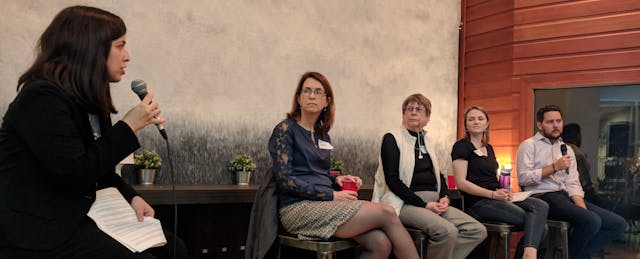Housing prices are still soaring in many major metropolitan areas today. In the San Francisco metro area, an $82,000 annual salary is considered “low income” for a single adult. For a family of four, the number is $117,400, according to a study from the Department of Housing and Urban Development.
When it comes to higher ed, it’s increasingly hard on low-income families and students working to make ends meet on their path to a degree. For some students, the technology sector offers one career pathway to keep up with the rapidly changing economy and landscape, according to a group of panelists at an EdSurge meetup in Oakland, Calif. this week.
Getting those jobs isn’t simple, and it’s no secret that the technology industry struggles to recruit and retain people of color, women and employees from low-income backgrounds, explained panel moderator and EdSurge reporter Tina Nazerian. But educators and higher-ed institutions may be able play a part to get more underrepresented students into the talent pipeline for the tech industry.
To bring more underrepresented students into the pipeline, Nazerian started things off by asking each panelist how their institution defines and specifically recruits students from diverse backgrounds.
JD Yaske, a board member and programming class instructor at Gameheads, an Oakland-based nonprofit that teaches game design to low-income youth and those of color, said the program doesn’t specifically target any racial or gender demographic, but wants to bring more diversity to major gaming companies. “A lot of the [gaming] industry looks like me, a white male transplant from Michigan,” said Yaske. “The purpose of our organization is to bring some of those jobs back to the Bay.”
Panelist Michelle Glauser shared that her nonprofit, Techtonica, specifically trains women and nonbinary people from the Bay Area. She founded the organization after landing a tech job herself and quickly realizing that the industry was severely lacking diversity. “The people who weren’t in tech are the ones being displaced by tech.”
Roadblocks can spring up at any point for students pursuing a career in tech. One common challenge is networking, and how difficult breaking into tech can be for students who don’t already have strong communities or mentors.
“The problem is networking, or lack of networking,” said Glauser. “If you don’t see people who look like you and you don’t have the right connections,” it can be hard to land an interview even if students have training in tech skills. At Techtonica, she said, students are required to attend tech events and start building that network.
Judy Lee, an associate professor and department chair at Golden Gate University, shared that students at her institution, many of whom are adult learners, are encouraged to network on campus. “Adjunct faculty are all working in the Bay Area and we encourage students to network with professors first,” said Lee.
Panelists then dove into what companies themselves need to do to address bias in their own organization and hiring practices.
Yaske pointed out how easy it can be for employees in charge of hiring to make unintentionally biased decisions. “When you’re confident in your own abilities and you want to pick people who you think will get along or work with you, you tend to unconsciously hire people who look like you and sound like you.
“Just because someone talks a different way than you, it doesn’t mean their coding skills or art skills are different than yours,” he continued. “And if it is, that could be a good thing.”
Kara Gardner, associate dean of faculty development at Minerva, suggested assembling a committee for hiring decisions, and making sure that committee represents diverse backgrounds and viewpoints. Glauser added that companies start by implementing a Rooney Rule, a policy that started in the NFL and entails considering at least one minority candidate for open positions.
“A lot of companies need to expand their expectations for job descriptions,” she continued. “Right now so many say, ‘We want you to have a masters in CS,’ when so many people are using nontraditional pathways these days.”
Later, one audience member asked the all-white panel: “How do you address your whiteness, and how do you feel that most of this work is being led by white communities?”
Yaske said he feels motivated to pass on the mentorship he had growing up to students who don’t have access to the kind of support networks he enjoyed. “I understand the help I had getting into the [gaming] industry, and these students don’t have the same support structures and opportunities I had.”
Three years ago, Glauser helped spearhead a viral online campaign, #ILookLikeAnEngineer, to promote diversity in tech. Despite getting a lot of attention and participation, she explained how it fell short: “It inspired people but it didn’t change lives,” she said. After the campaign she later began working on Techtonica, and said that one of her goals with the program is “to replace myself with someone from our program” to lead the organization.
Glauser added that she tries to bring in women of color in the tech industry to meet and mentor the students in her program. “But if I am constantly asking people who are underrepresented in tech to come to our students,” she said, “then I am putting more work on them.”
Gardner said that unconscious bias training isn’t only limited to staff and faculty at Minerva. “We teach about bias in our courses. We do talk to students about how that operates and how we judge people in all kinds of ways,” she said. “I think I have become even more conscious about it since I have been at Minerva because we design curriculum around that.”


